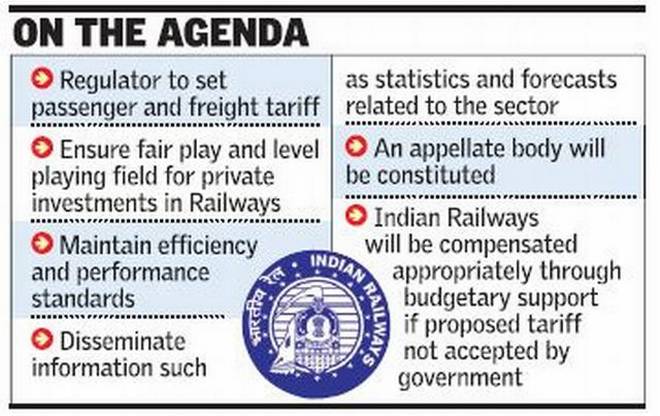Regulator for Railways coming soon – Train Fares Likely to go up
Brace to pay more for your travels by railways from this summer.
Fares are expected to shoot up as the government is almost ready to set up by June an independent railway regulator that will determine passenger and freight tariffs.
Called the Rail Development Authority, it can recommend tariff changes periodically by taking into account all direct and indirect costs such as pension, debts and market-driven forces.

“The Rail Development Authority would be an independent body, housed outside the Ministry of Railways but funded through the annual railway budget sanctioned by the Parliament. The approved Budget would be placed at the disposal of the regulatory authority. It would also be permitted to arrange funds through adjudication fees, penalties levied and any other source as specified in the proposed Act,” according to the concept paper uploaded on Ministry of Railways’ website to elicit public comments.
The authority will set tariff based on cost recovery principle and “what the traffic can bear.” All the direct and indirect costs such as pension liabilities, debt servicing, replacements and renewals along with productivity parameters, market-driven demand and supply forces and future investments will be considered by the regulator before setting tariffs.
“One can expect a gradual and calibrated increase in passenger fares, but a steep rise is unlikely as the regulator will also need to take care of the people.
Recently, the government had increased tatkal booking charges by up to 33 per cent for travel in sleeper class, AC-III tier, AC-II tier and executive class through an executive order.
It is a good decision, as the freight versus fare distortions need to be addressed,” former railway finance commissioner R Sivadasan said.
The move is aimed at unshackling the railways from political reluctance to hike fares, which has bled the country’s largest public transporter that carries 23 million passengers every day.
Train tariff is heavily subsidised because successive governments have shied away from the politically unpopular move of raising fares.
Currently, 67% of rail revenues come from shipping freight and just 27% from passenger tickets. Profits earned from freight are diverted to subsidise passenger fares.
The long-awaited plan to delink passenger and freight tariffs from political decisions is likely to get cleared by the Union cabinet this month, an official said.
The regulator will ensure a level playing field to private or foreign investors.
Investor sentiment in the railways has been low because of uncertainties and frequent policy changes.
“Among its other key functions, the authority will establish guiding principles to ensure a stable policy environment for private and foreign investors,” the official said.
The regulator will have a chairman and four officials, drawn from within and outside the railways, including the private sector.
Source: HT








 →
→











0 comments:
Post a Comment